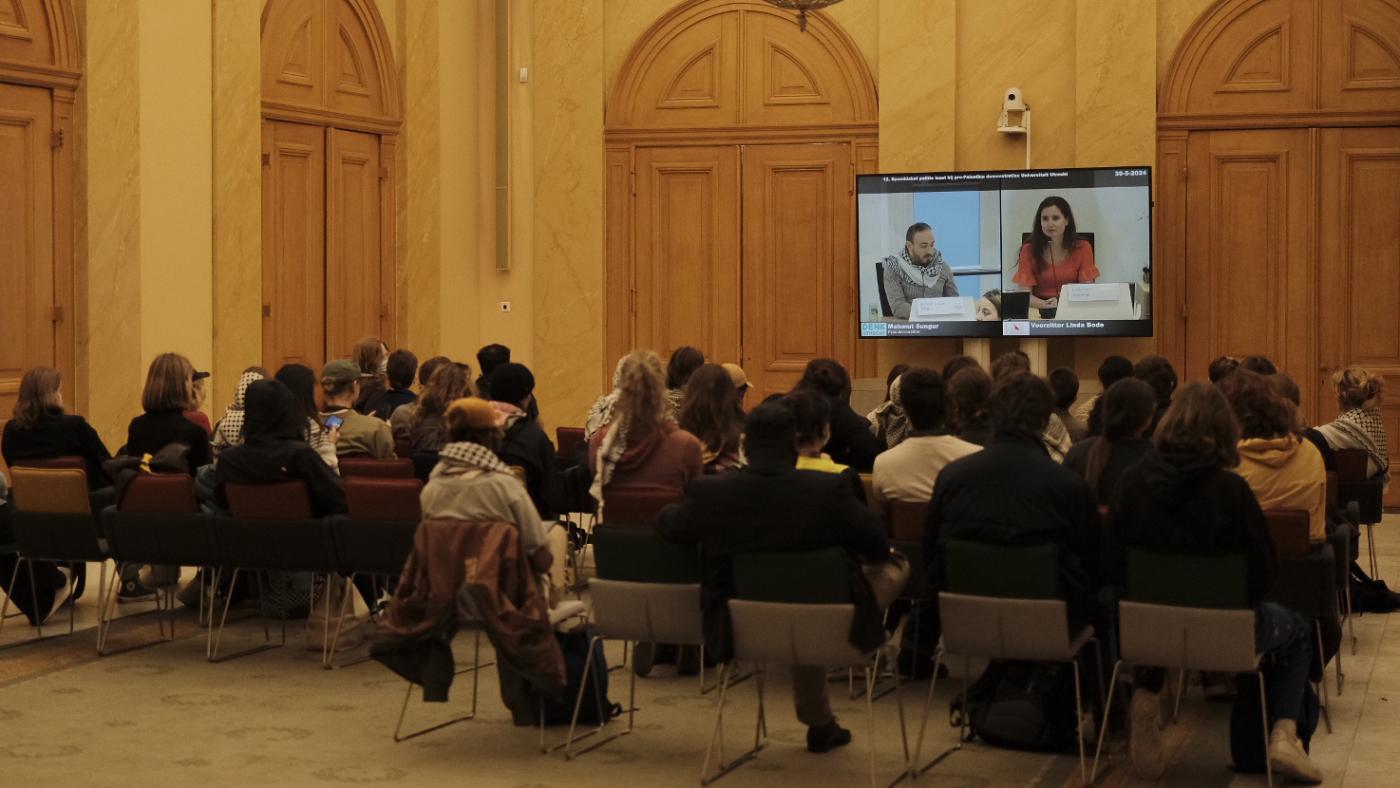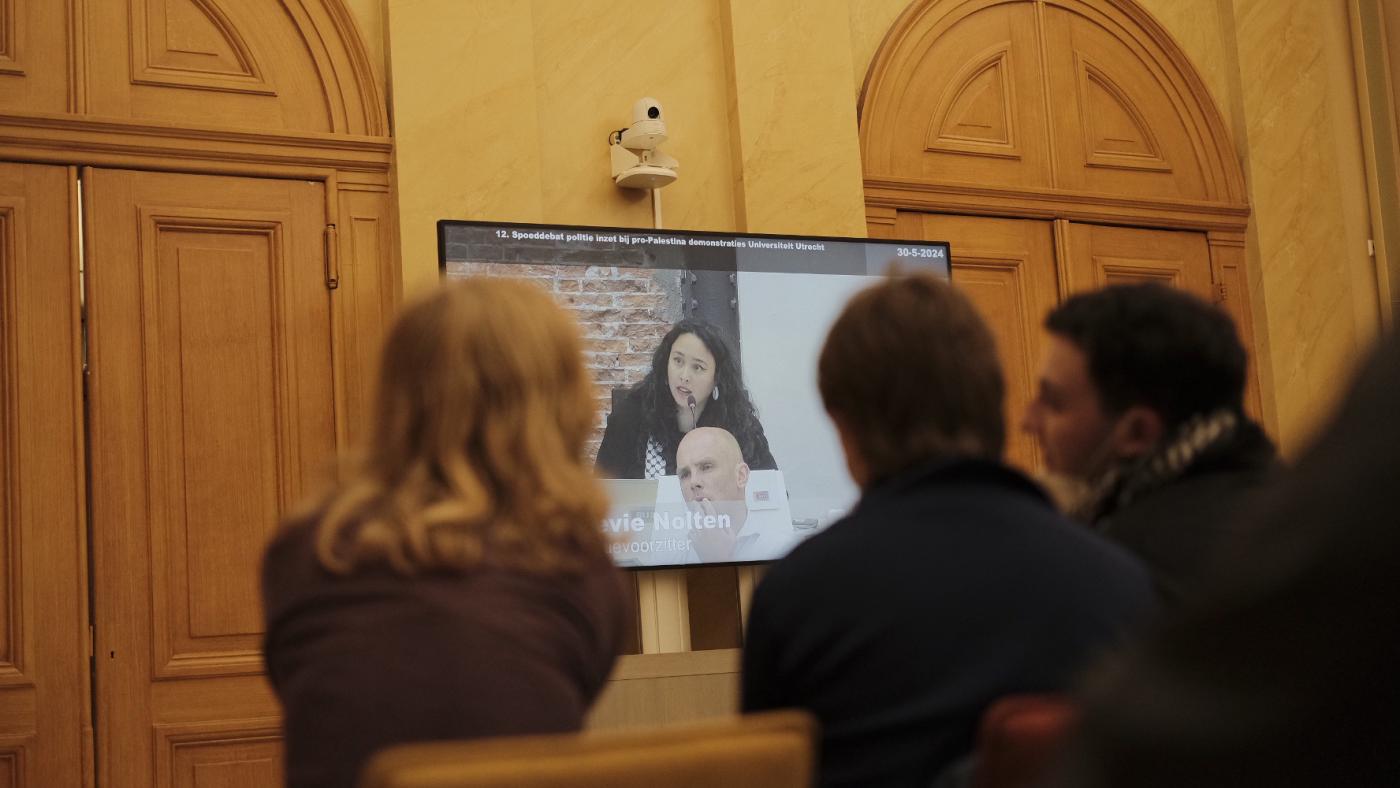Municipal council holds emergency debate about police intervention
Major differences in accounts by activists and police, further investigation required

The emergency debate was requested by the political parties Bij1 and Denk, who want the mayor to apologise and talk to the university to prevent such an escalation from happening again in the future. About fifty activists were listening attentively in the public gallery. They had left a protest that was going on in front of the university's courtyard to attend the debate.
It was a long meeting. Initiator Stevie Nolten, from Bij1, started. The party had talked to activists ahead of the debate and collected their stories. A total of 53 people reported that they were beaten with batons, even when they were lying on the ground. At least two demonstrators were rendered unconscious by riot police squeezing arteries. They received no medical attention. Furthermore, 25 people were dragged away, with one person being pulled through shards of glass with his back exposed.
According to the testimonies, the police also used verbal violence. Nolten summed up: "I have plans for her, you will get special treatment, you retarded." Three women were grabbed by the breasts. The demonstrators report that non-binary people and people of colour were treated more harshly. Nolten demanded a reflection and an apology from the mayor.

Mahmut Sungur from Denk went one step further. He wanted the municipality to urge the university to cut ties with Israeli universities and believed that the university should let peaceful demonstrators have their way. He felt that the mayor should press the university for the departure of its president, Anton Pijpers.
Other parties also noted that the information provided by the municipality and the police is at odds with activists' testimonies. For example, only twenty seconds passed between the police warning demonstrators to leave Voorstraat and their proceeding to use heavy batons. According to Geert Dijkstra, from EenUtrecht, if that's true, the police crossed the line. He asked for better protocols.
Amnesty International
The parties supported the right to demonstrate in university buildings and also to occupy them. They referred to Amnesty International, which indicates that Dutch law considers occupations a legitimate form of protest. According to most council members, Utrecht's policy of dialogue and de-escalation was not visible in this case.
Most parties believed that the municipality should not interfere with the university's policy, both in terms of choosing to collaborate with Israeli universities and dealing with demonstrators in buildings. But they did call on the university to give students and teachers room to protest peacefully.
Mayor
Mayor Sharon Dijksma answered all questions at around midnight. As the mayor, she indicated that she would safeguard the right to demonstrate, regardless of the cause. According to her, there is a big difference between a demonstration in a public space or a space that belongs to an organisation, such as a university.
She was not prepared to confront the university about matters as that would not suit her position. She did not agree with the criticism of Executive Board President Anton Pijpers, either. She finds the university's guidelines understandable. “The university has given demonstrators room to make their voices heard. They used the buildings' closing times as a guideline. After that time, the activists had to leave the site.” She also said that the university had tried to talk to the activists, but they refused to engage in a dialogue.
She said she was shocked by Bij1's stories and acknowledged that there was a discrepancy between what she had heard from the police and the testimonies. She was prepared to include this discrepancy in the evaluation and talk to the activists. She refrained from apologising because she preferred to investigate the matter first. Finally, she called on activists to either file a complaint or report the incident.
Nolten indicated that the activists are reluctant to do so as they distrust authority. According to Dijksma, the municipality must convey that such a report or complaint makes sense and will be taken seriously. Dijksma: “I have confidence in the police, but something could always have gone wrong. We have to investigate that carefully to learn lessons from that. The police are also open to doing so.”